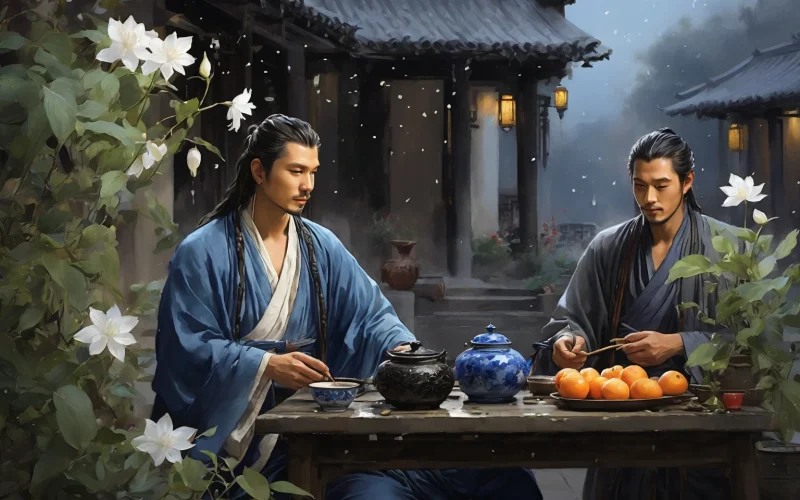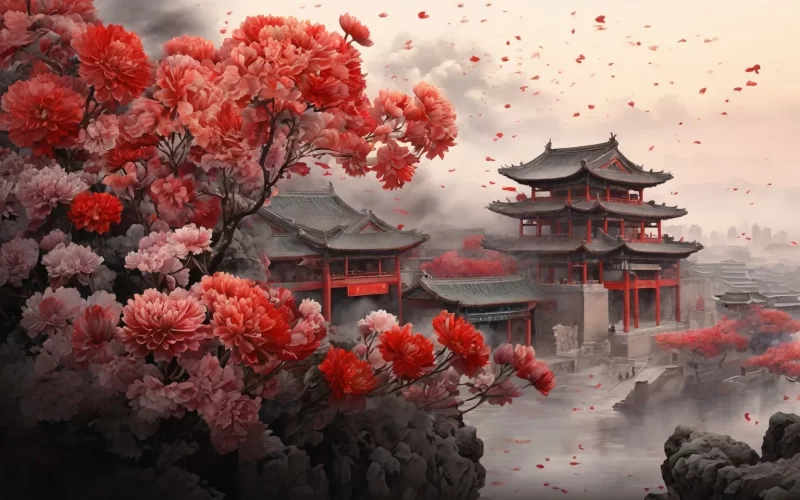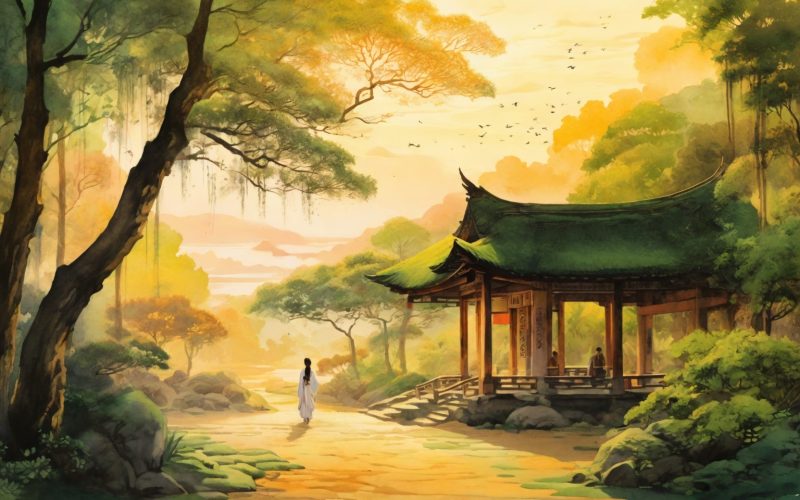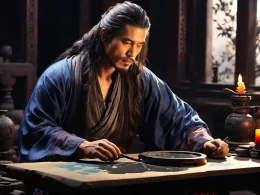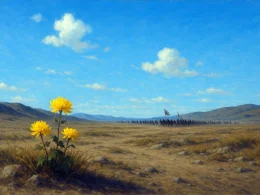The courtyard's fragrant with flowers blowing at night;
When night is deep, we wake from wine in drizzling rain.
We've not received from far away letters we write;
It's hard to talk about the bygone days with pain.
The children of the past have all grown tall and high;
Half of our friends and kinsmen are gone and departed
Tomorrow when my lonely boat bids you goodbye,
Can we, seeing the streamers, not be broken-hearted?
Original Poem
「夏夜宿表兄话旧」
窦叔向
夜合花开香满庭,夜深微雨醉初醒。
远书珍重何曾达,旧事凄凉不可听。
去日儿童皆长大,昔年亲友半凋零。
明朝又是孤舟别,愁见河桥酒幔青。
Interpretation
This seven-character regulated verse was composed during the Tang Dynasty by Dou Shuxiang upon reuniting with his cousin after a long separation. Through four thematic layers—nocturnal scenery, reminiscence, wartime chaos, and impending parting—the poem captures both the joy of reunion and the melancholy of farewell. Written with profound sincerity and quiet depth, it is a moving meditation on kinship and the passage of time.
First Couplet: « 夜合花开香满庭,夜深微雨醉初醒。 »
Yè hé huā kāi xiāng mǎn tíng, yè shēn wēi yǔ zuì chū xǐng.
Night-blooming flowers perfume the courtyard; Deep in the night, a light rain falls as I sober from wine.
The opening paints a tranquil summer night—fragrant blossoms and gentle rain creating an intimate setting. The speaker's gradual sobriety suggests prolonged conversation, their shared words and emotions as intoxicating as wine. This serene yet wistful atmosphere foreshadows the poem's emotional turns.
Second Couplet: « 去日儿童皆长大,昔年亲友半凋零。 »
Qù rì értóng jiē zhǎngdà, xī nián qīnyǒu bàn diāolíng.
Children we knew have all grown tall; Half the friends we cherished now lie beneath the soil.
Here, time's dual nature emerges: the growth of children contrasts starkly with the passing of elders. This meditation on life's cyclical patterns—youth ascending as age declines—lends the poem profound temporal weight.
Third Couplet: « 欲书尺素无从寄,况值乱离消息轻。 »
Yù shū chǐ sù wú cóng jì, kuàng zhí luànlí xiāoxi qīng.
Letters I longed to send found no recipients; How could news travel safely through war's chaos?
The couplet shifts to wartime realities, where even the basic human need to connect is thwarted. The frustration of undelivered letters ("no recipients") and unreliable communication ("war's chaos") reflects both personal and collective suffering during upheaval.
Fourth Couplet: « 明朝又是孤舟别,愁见河桥酒幔青。 »
Míngzhāo yòu shì gū zhōu bié, chóu jiàn hé qiáo jiǔ màn qīng.
At dawn, again I'll board a lonely boat— Dreading the sight of blue farewell tents by the bridge.
The conclusion circles back to the present, where "again" underscores the cyclical nature of parting. The "blue tents"—a visual marker of previous farewells—now symbolize accumulated sorrow. Their color (青) carries connotations of both vitality and melancholy, embodying the bittersweet essence of human connections.
Holistic Appreciation
The poet captures a night of familial reminiscence, weaving life experiences and emotional depth into this intimate setting. The opening lines establish quiet warmth, the middle section transitions to painful recollections, and the closing couplet expresses sorrow without bitterness, creating natural emotional undulations. Particularly striking is the couplet "Wanting to write a letter but having nowhere to send it," which reflects severed family connections during wartime, deepening the poem's historical context and social resonance. The work manifests profound feeling through seemingly plain language, revealing genuine emotion in subtle details - embodying the Tang regulated verse's pursuit of "valuing authenticity above all."
Artistic Merits
- Unadorned language brimming with lived experience: The conversational diction, devoid of ornate phrasing, carries remarkable emotional authenticity and warmth.
- Emotion embedded in scenery: From "night-blooming flowers" and "drizzling rain" to "tavern curtains by the bridge," each image becomes a vessel for layered emotional expression.
- Profound sincerity of feeling: Rather than superficial sentiment, the poem unfolds through recollections of life's vicissitudes, achieving moving verisimilitude.
- Organically rigorous structure: Progressing naturally from courtyard conversation to memories, wartime reflections, and parting sorrow, the four couplets develop coherent emotional progression.
Insights
This poem reminds us that across changing eras, familial bonds and remembrance remain essential to human experience. It demonstrates how literary creation should employ plain speech to convey deep emotion while skillfully using imagery and environment to amplify feeling, producing works that flow naturally yet resonate profoundly. Through delicate yet sincere brushstrokes, the poet renders life's most ordinary yet moving emotions with enduring profundity - an approach worthy of emulation in both artistic creation and lived experience. The work ultimately suggests that true artistic power lies not in grand gestures but in faithfully capturing the quiet, luminous moments of human connection.
Poem translator
Xu Yuanchong (许渊冲)
About the poet
Dou Shuxiang(窦叔向), who lived around 769 CE, was a poet and literary figure of the Tang Dynasty. He was known by the courtesy name Yizhi and came from an official family in Jincheng, Jingzhao. He was the son of Dou Dan, the Simama of Tongchang. Renowned for his poetic talent, Dou Shuxiang was especially skilled in composing five-character poems. His poetry collection originally consisted of seven volumes, but only nine poems survive today.






